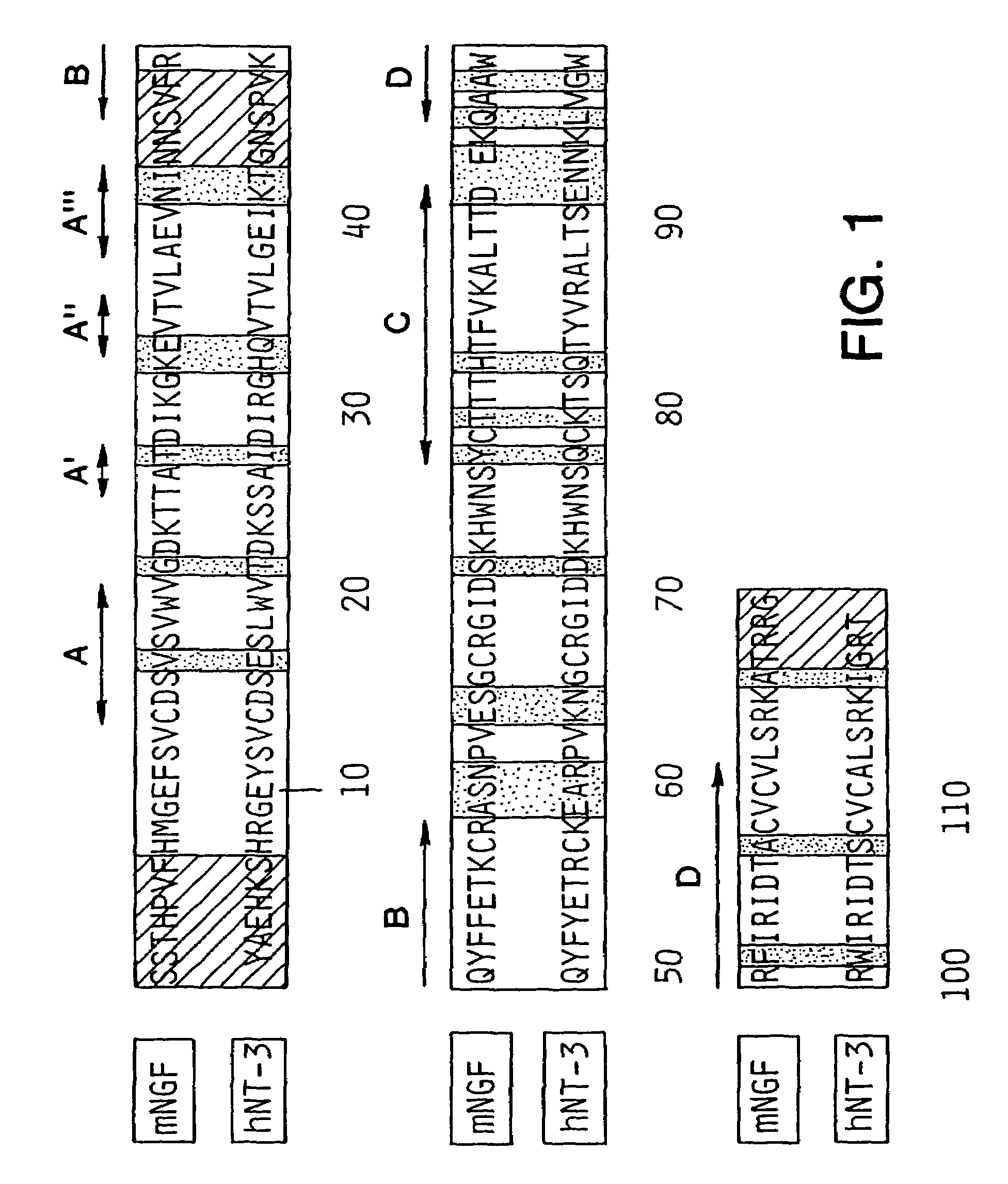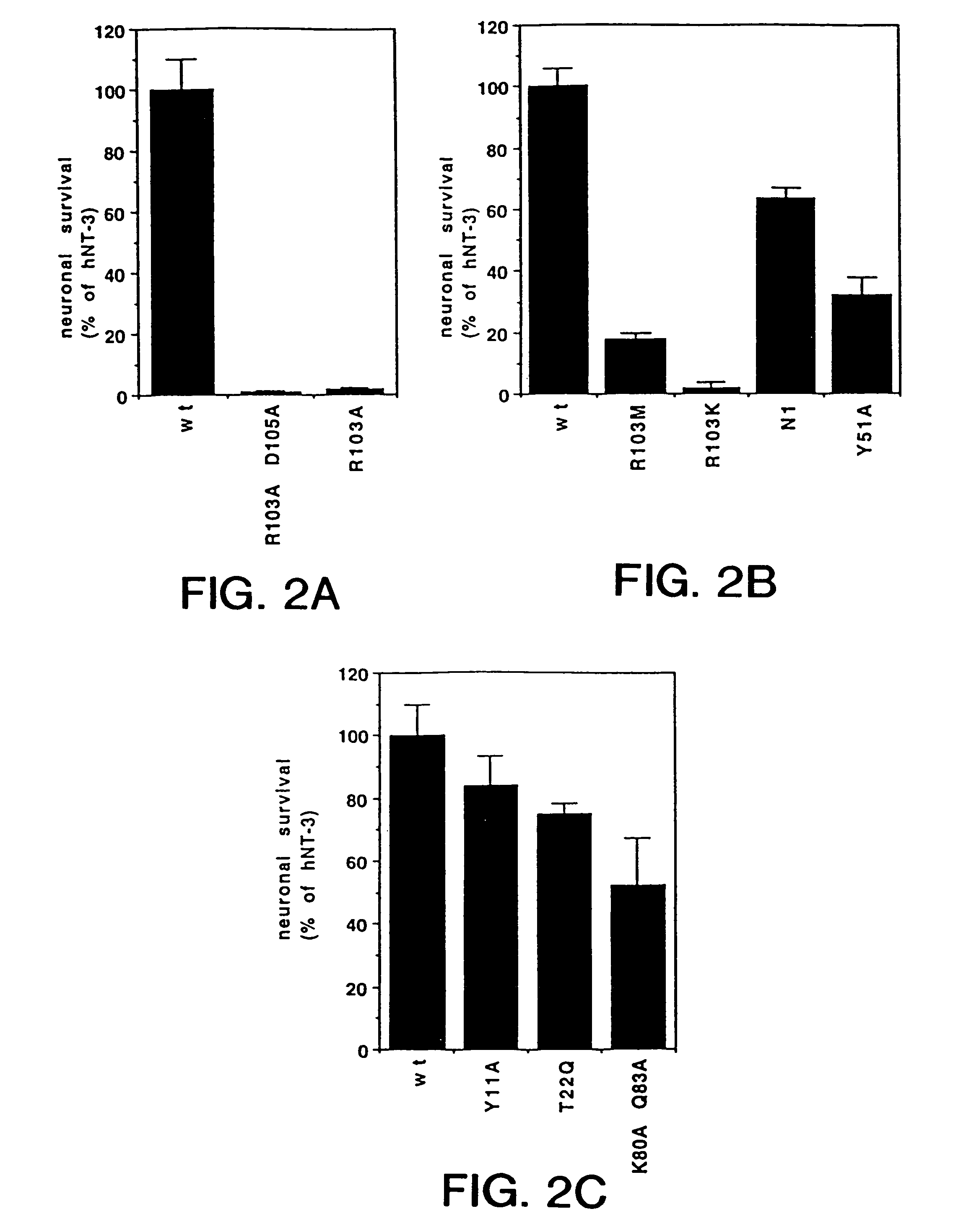Pantropic neurotrophic factors
a neurotrophic factor and pan-neurotrophic factor technology, applied in the field of pan-neurotrophic factors, can solve the problems of limited attempts to create chimeric or pan-neurotrophic factors, the death of superfluous neurons,
- Summary
- Abstract
- Description
- Claims
- Application Information
AI Technical Summary
Benefits of technology
Problems solved by technology
Method used
Image
Examples
example 1
Molecular Modeling of NT-3 and Identification of Targets for Mutational Analysis
[0102]The coordinates for the three-dimensional structure of mouse NGF were obtained from N. Q. McDonald and T. L. Blundell. The molecular modeling for human NT-3 was performed on a Silicon Graphics Iris Workstation using the interactive program InsightII. The representations of NT-3 structures were produced using the program MidasPlus. (University of California at San Francisco).
[0103]When the three-dimensional structure of mouse NGF (mNGF) became available (59) a rational approach to the structural basis of neurotrophic function using protein engineering techniques became possible. The structure of mNGF consists of a tightly associated dimer of two identical amino acid polypeptide chains. The fold of each monomer is formed by extended segments of twisted anti-parallel 8-sheets linked by turns. The molecule has an elongated shape and provides a flat hydrophobic surface that forms the interface of the as...
example 2
Generation of Specific Amino Acid Substitutions of NT3 and Pantropic NT3s
[0106]Human NT-3 was previously cloned, sequenced and subcloned into a pRK-type vector which allows for production of double and single stranded DNA in E. coli, as well as expression of mature NT-3 in a mammalian system under control of the cytomegalo virus promoter (65). Mutagenesis on this vector was performed according to the method of Kunkel (66) (67). After transformation into the E. coli strain XL1-Blue, colonies were screened for the presence of the desired mutation by sequencing single-stranded DNA using the Sequenase version 2.0 kit U.S. Biochemical Corp.). The entire sequence coding for the mature NT-3 was verified for all positive clones. Double-stranded DNA was isolated from XL-1 Blue with the QIAGEN DNA purification kit (Qiagen Inc., Chatsworth Calif.). This DNA was subsequently used for transfection of the fetal human kidney cell line 293 (68). All other recombinant DNA manipulations were performe...
example 3
Generation, Purification, and Characterization of N-Terminal NGF Variants
[0118]Several charged and uncharged residues are conserved among NGF proteins from other species. In particular, His4, Pro5, and His8 are conserved in 7 of 8 known NGF sequences; Arg9 exists only in human and chicken NGF while Met predominates at this position of NGF of other species. Ten mutants were generated by oligonucleotide-directed mutagenesis that either: 1) replaced some of the charged residues of the N-terminus of hNGF with alanine individually or together, 2) replaced His4 with negatively charged aspartic acid which resides in position 3 of the N-terminal hBDNF sequence (65), or 3) generated chimeric hNGF molecules which contained the first 5 or 6 residues of hBDNF or hNT3, respectively, or other variable regions of hNT3. The resulting mutant constructs were generated in vectors containing a human CMV promoter (70) and were expressed transiently in human 293 cells as described below.
[0119]Purified re...
PUM
| Property | Measurement | Unit |
|---|---|---|
| molecular mass | aaaaa | aaaaa |
| mass | aaaaa | aaaaa |
| pH | aaaaa | aaaaa |
Abstract
Description
Claims
Application Information
 Login to View More
Login to View More - R&D
- Intellectual Property
- Life Sciences
- Materials
- Tech Scout
- Unparalleled Data Quality
- Higher Quality Content
- 60% Fewer Hallucinations
Browse by: Latest US Patents, China's latest patents, Technical Efficacy Thesaurus, Application Domain, Technology Topic, Popular Technical Reports.
© 2025 PatSnap. All rights reserved.Legal|Privacy policy|Modern Slavery Act Transparency Statement|Sitemap|About US| Contact US: help@patsnap.com



